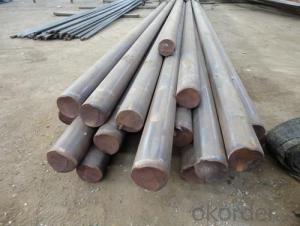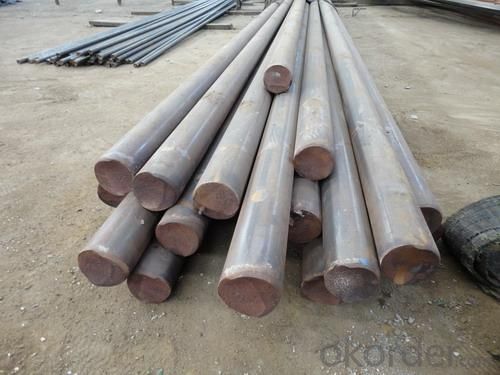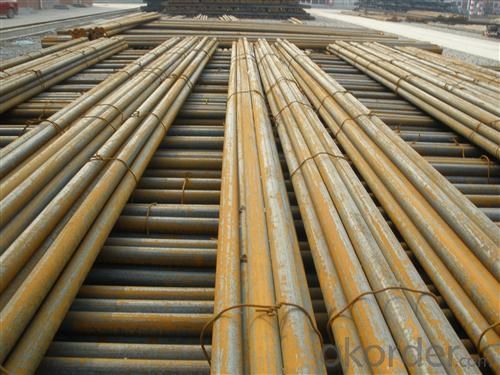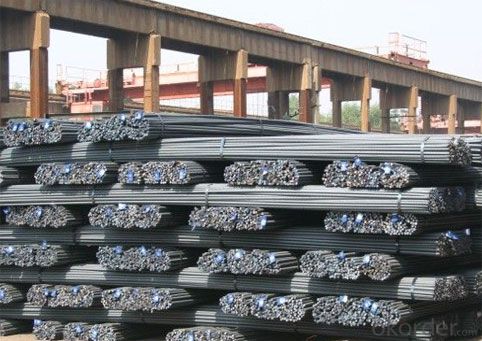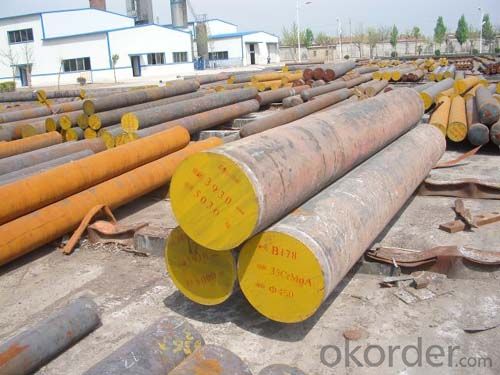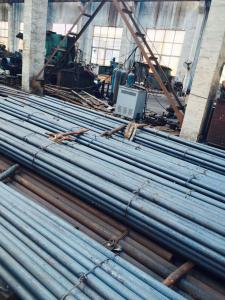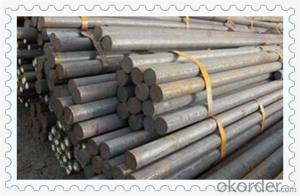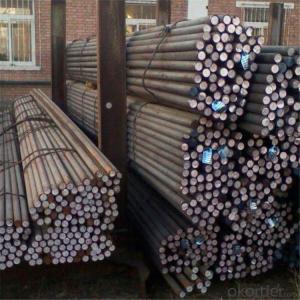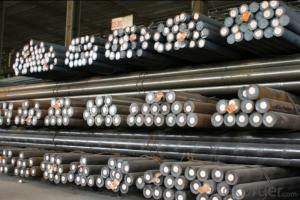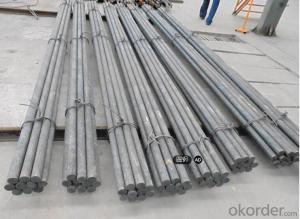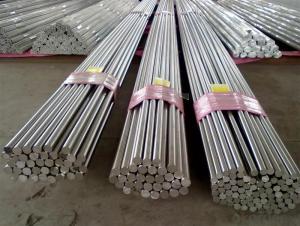Cold Drawn AISI 1045 Carbon Steel Round Bars
- Loading Port:
- China main port
- Payment Terms:
- TT or LC
- Min Order Qty:
- 25 m.t.
- Supply Capability:
- 10000 m.t./month
OKorder Service Pledge
OKorder Financial Service
You Might Also Like
Specification
The details of our Steel
1. Produce Standard: as the GB, AISI, ASTM, SAE, EN, BS, DIN, JIS Industry Standard
2. Produce processes: Smelt Iron -EAF smelt Billet - ESR smelt Billet -Hot rolled or forged get the steel round bar and plate
3. Heat treatment:
Normalized / Annealed / Quenched+Tempered
4. Quality assurance:
All order we can received Third party inspection, You can let SGS, BV,.. and others test company test and inspect our products before Goods shipping.
Product information
1.ChemicalComposition(%) |
carbon:0.43-0.50 Silicon:0.10-0.35 Manganese: 0.60-0.90 |
2.Equivalent Grades | SAE1045,AISI C1045,S45C,C45 |
3.Form&Size | 1)1045 carbon Steel round bars, flat/square bars,plates,sheets. |
2)AISI 1045 carbon steel Size Available(Length can be customized) | |
4.Round bar | 16mm-690mm Dia |
5. Typical Mechanical Properties | Tensile strength Mpa:640 Yield strength Mpa:410 Elongation in 50% mm %:22 Impact lzod J:170-210 Hardness:HB 187 / HRC 10 |
6.Machining | AISI 1045 steel has good machinability in normalized as well as the hot rolled condition. Based on the recommendations given by the machine manufacturers, operations like tapping, milling, broaching, drilling, turning and sawing etc. can be carried out on AISI 1045 steel using suitable feeds, tool type and speeds. |
7.Welding | AISI 1045 steel is readily welded when correct procedure is followed. Welding AISI 1045 steel in through-hardened, tempered and flame or induction hardened condition is not recommended. Low hydrogen electrodes are preferred for welding AISI 1045 steel. The workpiece is Pre-heated at 200°C–300°C (392°F - 572°F) Maintained at the same temperature during welding Cooled slowly using sand, ashes etc and Stress relieved at 550°C - 660°C (1022°F - 1220°F). |
8.Related Specifications | W.Nr 1.0503 C45 W.Nr 1.1191 CK45 AISI C1045 ASTM A29/A29M-91 1045 SAE 1045 UNS G 10450 |
9.HeatTreatment | Annealing:Heat to 800°C-850°C hold until temperature is uniform throughout the section,and cool in furnace. |
Hardening:Heat to 800°C-850°C hold until temperature is uniform throughout the section,soak for 10-15 minutes per 25mm of section,and quench in water or brine.or Heat to 830°C -860°C soak as above and quench in oil.Temper immediately while still hand warm. | |
Tempering:Re heat to 400°C-650°C as required,hold until temperature is uniform throughout the section,soak for 1 hour per 25mm of section,and cool in still air. | |
10.Quality Certificate | 1)Grade,Size,Quantity in Number & Weight |
Product show

Workshop show

- Q: How does special steel perform in high-velocity impact conditions?
- Special steel is specifically engineered to excel in high-velocity impact situations, providing outstanding performance. Its composition and metallurgical properties are unique, resulting in remarkable resistance to deformation and failure under extreme forces. A key characteristic of special steel is its exceptional strength, enabling it to withstand the immense forces encountered in high-velocity impact scenarios. This strength is achieved through meticulous alloying and heat treatment processes that enhance the material's capacity to absorb and distribute energy. Consequently, special steel can effectively resist deformation and preserve its structural integrity even when subjected to severe impact loads. Moreover, special steel possesses remarkable toughness, allowing it to absorb significant amounts of energy before fracturing. This characteristic is crucial in high-velocity impact conditions where the material must endure sudden and intense forces. The high toughness of special steel permits it to absorb and dissipate the impact energy, preventing catastrophic failure and ensuring the ongoing performance of the component or structure. Additionally, special steel often exhibits superb resistance to wear and abrasion, which is advantageous in high-velocity impact scenarios involving sliding or rubbing contact. This wear resistance guarantees that the material maintains its integrity and functionality even during prolonged and repetitive impact conditions, reducing the risk of premature failure. Overall, special steel excels in high-velocity impact conditions due to its exceptional strength, superb toughness, and superior wear resistance. Its ability to withstand extreme forces and efficiently absorb impact energy makes it the preferred choice for applications where durability and reliability are of utmost importance.
- Q: Can special steel be used for cutting tools?
- Yes, special steel can be used for cutting tools. Special steels, such as high-speed steel or tool steel, are specifically designed to have superior hardness, toughness, and wear resistance, making them ideal for manufacturing cutting tools that can withstand high temperatures and perform precision cutting operations.
- Q: What are the factors affecting the cost of special steel?
- There are several factors that can affect the cost of special steel. Firstly, the cost of raw materials used in the production of special steel, such as iron ore and alloys, can have a significant impact on its overall price. Additionally, the level of demand for special steel, both domestically and globally, can influence its cost. Factors such as market competition, economic conditions, and government policies can also play a role in determining the price of special steel. Lastly, the complexity of the manufacturing process, including the level of skill required and the use of advanced technologies, can contribute to the higher cost of special steel compared to regular steel.
- Q: How is bearing steel used in the manufacturing of bearings?
- Bearing steel is a specialized type of steel that is used in the manufacturing of bearings to ensure high performance and durability. It is specifically designed to have excellent hardness, wear resistance, and fatigue strength. Bearing steel is used to produce the inner and outer rings, as well as the rolling elements and cages of bearings. By using bearing steel, manufacturers can produce bearings that can withstand heavy loads, high speeds, and continuous rotation, ensuring smooth operation and longer lifespan of the bearings.
- Q: Can special steel be used in the manufacturing of firearms?
- Yes, special steel can be used in the manufacturing of firearms. Special steel, such as stainless steel or alloy steel, offers enhanced strength, durability, and resistance to corrosion, making it well-suited for firearm construction.
- Q: How is weathering steel used in outdoor structures?
- Weathering steel, also known as corten steel, is commonly used in outdoor structures due to its unique properties. It forms a protective rust-like surface when exposed to the elements, which acts as a natural barrier against further corrosion. This makes it highly resistant to rust and erosion, making it ideal for outdoor structures such as bridges, sculptures, architectural facades, and retaining walls. Additionally, weathering steel is aesthetically pleasing and requires minimal maintenance, making it a popular choice in various outdoor applications.
- Q: What are the different surface cleaning methods used for special steel?
- There are several surface cleaning methods that can be used for special steel, depending on the specific requirements and the level of cleanliness desired. Some of the commonly used methods include: 1. Mechanical Cleaning: This method involves the use of abrasive materials or tools to physically remove dirt, rust, and other contaminants from the surface of the steel. It can be done through processes such as sanding, wire brushing, or abrasive blasting. 2. Chemical Cleaning: Chemical cleaning involves the use of chemical agents to dissolve or loosen dirt, grease, oil, or rust from the surface of the steel. Different types of chemicals can be used depending on the type and severity of the contaminants. Acid pickling is one such method that involves immersing the steel in an acid solution to remove scale and rust. 3. High-pressure Water Cleaning: This method utilizes the force of high-pressure water jets to remove dirt, grease, and other contaminants from the surface of the steel. It is effective in removing loose particles and can be used as a pre-cleaning step before other surface preparation methods. 4. Ultrasonic Cleaning: Ultrasonic cleaning is a non-abrasive method that uses high-frequency sound waves to create microscopic bubbles in a cleaning solution. These bubbles implode upon contact with the surface of the steel, effectively removing contaminants from hard-to-reach areas. 5. Electrochemical Cleaning: This method involves passing an electric current through a cleaning solution or electrolyte to facilitate the removal of contaminants from the steel surface. It is useful in removing rust and restoring the steel's appearance. 6. Thermal Cleaning: Thermal cleaning methods, such as flame cleaning or heat treatment, involve subjecting the steel to high temperatures to burn off organic contaminants or to induce controlled oxidation and subsequent removal of scale, rust, or other surface impurities. It is important to note that the choice of surface cleaning method depends on various factors, including the type of contaminants, the condition of the steel, the desired level of cleanliness, and the overall application requirements. A combination of different methods may be used to achieve the best results.
- Q: How does special steel contribute to the manufacturing of automotive engine components?
- The manufacturing of automotive engine components heavily relies on special steel to enhance their strength, durability, and performance. Special steel possesses unique properties that make it suitable for critical engine parts like crankshafts, camshafts, connecting rods, valve springs, and cylinder heads. The exceptional strength of special steel is one of its primary advantages in automotive engine components. Engine parts made from special steel can withstand high stress, heavy loads, and extreme temperatures without experiencing deformation or failure. This strength ensures that the engine operates efficiently and reliably, even under demanding conditions. Furthermore, special steel offers superior durability, which is crucial for the longevity and performance of engine components. Its resistance to wear, corrosion, and fatigue ensures that the engine parts maintain their functionality for an extended period. This durability translates into increased lifespan and reduced maintenance requirements for the engine, resulting in higher customer satisfaction and lower costs for vehicle owners. The use of special steel in automotive engine components also contributes to improved performance. Special steel allows for the creation of lightweight components, reducing the overall weight of the engine and enhancing fuel efficiency. Additionally, the high precision and dimensional accuracy achievable with special steel manufacturing processes result in better engine performance, reduced friction, and improved power output. Moreover, special steel exhibits excellent machinability, simplifying the manufacturing process of engine components. Its ability to be easily formed, cut, and shaped enables the production of complex designs and intricate features, leading to enhanced efficiency and performance in the final product. In conclusion, special steel plays a vital role in the manufacturing of automotive engine components due to its exceptional strength, durability, and performance. Its usage results in engines that are more reliable, efficient, and long-lasting, ultimately contributing to the overall quality and satisfaction of vehicles.
- Q: What is the cost of special steel compared to regular steel?
- The cost of special steel is generally higher compared to regular steel due to its unique properties, composition, and production processes.
- Q: How does special steel contribute to reducing product maintenance requirements?
- Special steel contributes to reducing product maintenance requirements by offering superior strength, durability, and resistance to corrosion and wear. This means that products made with special steel are less likely to break, degrade, or require frequent repairs or replacements. Its high-quality properties enable longer product lifespans and enhanced performance, ultimately minimizing maintenance efforts and costs for users.
Send your message to us
Cold Drawn AISI 1045 Carbon Steel Round Bars
- Loading Port:
- China main port
- Payment Terms:
- TT or LC
- Min Order Qty:
- 25 m.t.
- Supply Capability:
- 10000 m.t./month
OKorder Service Pledge
OKorder Financial Service
Similar products
Hot products
Hot Searches
Related keywords
